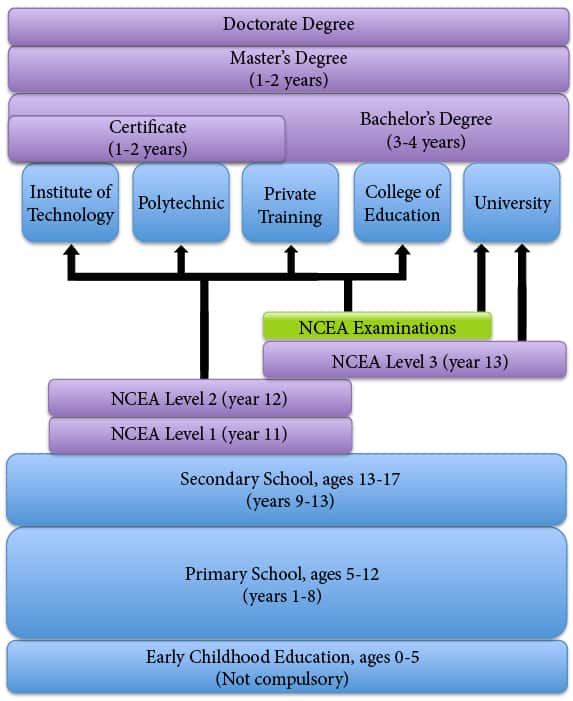Welcome to the New Zealand Schooling System: A Parent’s Companion

G’day, dear parents! If you’re peering at the New Zealand schooling system like a fantail at a shiny trinket, you’re in the right nest. Whether you’ve just winged your way to Kiwiland or you’re a local looking to navigate the education pathway for your tamariki (children), this guide is crafted to help you understand how the New Zealand education system takes every child on a unique learning voyage.
In New Zealand, we’re proud of our world-renowned education system – it’s as dazzling as the Southern Cross in our night sky! Starting with the early childhood education (ECE), moving through primary and intermediate schooling, and soaring into secondary education, New Zealand offers a holistic and nurturing environment for every learner.
A Whirlwind Overview of New Zealand’s Education System
Our educational journey here kicks off with early childhood education (ECE), followed by primary schools, intermediate schools (in some areas), and then secondary schools. The New Zealand Qualifications Authority (NZQA) oversees the secondary school qualifications, ensuring your child’s achievements are recognized both locally and globally.
Early Childhood Education (ECE)
Age group: Birth to 5 years
Before stepping into formal education, your little kiwis can take advantage of early childhood education (ECE). This optional but highly recommended phase is all about play-based learning. ECE providers include kindergartens, education and care services, home-based care, and language nests such as Te K?hanga Reo, focusing on M?ori language immersion.
Primary Schooling
Age group: 5 to 10/11 years (Years 1 to 6)
Primary schooling begins at year 1 and goes up to year 6 or 8, starting with the milestone of a child’s 5th birthday – the official age for starting school in New Zealand. At this level, schools lay down the golden nuggets of reading, writing, and math, while also exploring science, technology, the arts, and social studies within a flexible and inclusive curriculum.
Intermediate Schooling (Optional)
Age group: 11/12 to 12/13 years (Years 7 to 8)
In some regions of New Zealand, children attend an intermediate school for years 7 and 8, serving as a bridge to secondary education. It’s a great way for students to adjust to different teaching styles and subject options before diving into the bigger pond of high school.
Secondary Schooling
Age group: 13 to 18 years (Years 9 to 13)
Secondary schooling, also known as high school or college, prepares students for tertiary education or entering the workforce. It’s capped off with the NCEA (National Certificate of Educational Achievement) – New Zealand’s flagship qualification for students in years 11 through 13.
Your Child’s Pathway to Success
One of the beauties of the New Zealand education system is its commitment to diversity and personalised learning. Education reflects the Treaty of Waitangi principles, embracing M?ori culture and language alongside a multitude of other cultures represented on these shores. Every school has a unique setting and character, offering a varied curriculum tailored to the community it serves.
Whether your child has a passion for sports, the arts, sciences, or languages, Kiwi schools work to unearth and foster these interests. The focus on key competencies like thinking, using language and symbols, managing self, relating to others, and participating and contributing is designed to prepare young minds for a rapidly changing world.
Hang on to this guide as we delve deeper into each stage of the New Zealand schooling system, including crucial tips on choosing the right school for your child, understanding the assessment process, and engaging with the school community. The journey through education should be a memorable adventure, filled with learning, laughter, and personal growth – for children and parents alike.
Whether rural or urban, North Island or South Island, public or private, comprehensive or specialized – the schooling options in New Zealand offer a rich tapestry for your little kiwi’s academic and personal development. So let’s unravel it together, one vibrant thread at a time!
Stay tuned as we untangle the intricacies of the ECE and dive into what the primary school universe holds for your young learners. We’re just scratching the surface of this beautiful educational landscape, my friends, so keep those reading glasses polished, and let’s explore further!

Five Things Parents Should Know in Preparing for the New Zealand Schooling System
Navigating schooling in New Zealand can be a breeze when you’re equipped with the right info. Here are five key points you need to keep in mind:
1. Understanding the Enrollment Process
You’ll find that most schools in New Zealand have designated zones called ‘school zones’. Live within the zone, and your child has a high priority to attend. It’s essential to check school zones when you’re house hunting to ensure your child’s spot at your preferred local school. For primary and intermediate education, some schools require an application process—be sure to check the enrollment dates as they can vary.
2. Embracing Bicultural Education
It’s imperative to recognize that New Zealand’s curriculum embraces bicultural education. Encourage your child to engage with Te Reo M?ori and the principles of the Treaty of Waitangi, which are integrated into the curriculum. This will not only foster cultural understanding but also enrich your child’s educational experience.
3. Getting to Grips with NCEA
The National Certificate of Educational Achievement (NCEA) is the main secondary school qualification in New Zealand. Familiarizing yourself with how NCEA works and its credit system will enable you to support your child through secondary school effectively. This includes understanding ‘achievement standards’ and ‘unit standards’, as well as the credit requirements for university entrance.
4. Selecting the Right School
Beyond academic performance, consider the school’s culture, values, and extracurricular activities when choosing the best fit for your child. Open days, school visits, and talks with other parents can provide valuable insights into a school’s environment. Remember, every child is different—what works for one, may not suit another.
5. Staying Involved in Your Child’s Education
From volunteering at school events to joining the PTA (Parent-Teacher Association), staying involved in your child’s educational experience is crucial. It helps to build a strong relationship with teachers and provides a support system for your child’s academic and social development. Staying involved also keeps you informed about changes or updates within the schooling system.
While we’ve offered a glimpse into the Kiwi education system, the journey has just begun. Preparing for schooling in New Zealand is like preparing for a great walk—you need the right gear and knowledge to navigate the path ahead. So lace up, take these tips on board, and step out with confidence. The New Zealand schooling adventure awaits you and your child!
See more great Things to Do with Kids in New Zealand here. For more information see here
Disclaimer
The articles available via our website provide general information only and we strongly urge readers to exercise caution and conduct their own thorough research and fact-checking. The information presented should not be taken as absolute truth, and, to the maximum extent permitted by law, we will not be held liable for any inaccuracies or errors in the content. It is essential for individuals to independently verify and validate the information before making any decisions or taking any actions based on the articles.




